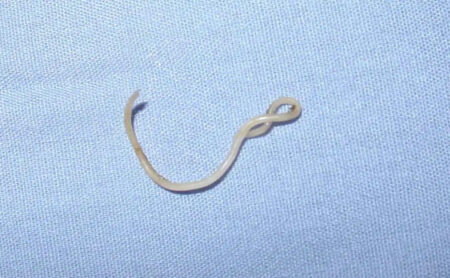Small white worms in dog poop can be a concerning sight for dog owners. These worms, also known as tapeworms, are a common parasite affecting dogs of all ages and breeds. They are usually present in the intestines and shed segments of their bodies in the dog’s feces.
The presence of these small white worms in dog poop can indicate a larger underlying health issue in the dog, such as an infection or poor nutrition. Dog owners need to be aware of the causes and treatment options for these worms to protect their pet’s health and prevent further infestations.
In this article, we will discuss the causes of tapeworm infestations in dogs, the signs and symptoms to look out for, and the various treatment options available. We will also explore the importance of prevention and proper hygiene practices to keep both dogs and humans safe from these parasites.
Dog owners should always monitor their pet’s feces and seek proper treatment if they notice any signs of tapeworms. While not usually life-threatening, these worms can cause discomfort and serious health complications if left untreated. By learning more about this topic, dog owners can ensure their furry companion’s well-being and prevent any future infestations.
Small White Worms In Dog Poop: Causes And Treatment
Small white worms in dog poop can be a sign of an intestinal parasite infection in dogs. These worms, known as roundworms, hookworms, whipworms, or tapeworms, can pose a serious health threat to dogs if left untreated. These parasites can cause a range of symptoms in dogs, such as diarrhea, weight loss, and poor coat condition. In severe cases, they can even lead to anemia and other serious health complications.
There are several possible causes of small white worms in dog poop, including infestation from eggs in the environment, ingestion of infected animals, or spread from mother to puppies during birth or nursing. These worms can also be transmitted to humans, so it’s important to treat them promptly and prevent further infestation.
The most common method for diagnosing and treating small white worms in dog poop is through a fecal exam performed by a veterinarian. Treatment typically involves deworming medications, which can vary depending on the type of parasite. In addition to medication, maintaining good hygiene and regularly cleaning up after your dog can help prevent future infestations.
Maggots in Dog Poop
If you see maggots in your dog’s poop, the poop has likely been sitting around for a while. Maggots are the larvae of flies, and they feed on decaying organic matter. In the case of your dog’s poop, the maggots are likely feeding on the bacteria and other organic matter that is present in the feces. While this can be a bit gross to think about, it’s not necessarily a cause for concern. If your dog is otherwise healthy and the maggots are confined to the poop, you don’t need to take any special action.
Worms in Dog Poop That Look Like Rice
If you see small, rice-like objects in your dog’s poop, they are most likely roundworms. Roundworms are a common parasite that can infect dogs and cause a variety of health problems. While they may look like rice, they are thin, white worms that can grow up to several inches long. In addition to roundworms, other types of intestinal parasites can cause rice-like objects in your dog’s poop. These include tapeworms and hookworms. If you suspect your dog has intestinal parasites, it’s important to take them to the vet for diagnosis and treatment.
What is The Difference Between Maggots And Worms in Dog Poop?
Maggots and worms are two very different things, and they can often be easily distinguished. Maggots are the larvae of flies, and they are often found in moist, decomposing organic matter. They are creamy white or yellow and are about the size of a grain of rice. Worms, on the other hand, are parasitic organisms that live in the intestines of animals. They are typically long and thin and may be a variety of colors, including white, yellow, red, or brown. Worms are rarely seen in dog poop, as they typically live in the intestines and are not usually excreted.
Types of Worms in Dog Poop
- Roundworms: These are the most common type of worms found in dog poop. They are long, spaghetti-like worms that can grow up to several inches in length. They can cause a range of symptoms such as diarrhea, weakness, and a pot-belly appearance.
- Hookworms: These worms are small and thread-like, and they attach themselves to the lining of the dog’s intestine and feed on blood. Symptoms of hookworm infestation may include anemia, weight loss, and bloody stools.
- Whipworms: These worms are thin and whip-like, and they reside in the large intestine of the dog. Their presence can cause symptoms such as chronic diarrhea, weight loss, and anemia.
- Tapeworms: These worms are long and flat, and they are segmented. They can often be seen in the dog’s poop or around the anus. They do not usually cause any symptoms but can result in weight loss and irritation around the anus.
- Heartworms: These worms reside in the heart and blood vessels of the dog, and are transmitted through mosquito bites. They can cause serious damage to the heart and lungs if left untreated, and symptoms may include coughing, lethargy, and difficulty breathing.
Causes Of Small White Worms In Dog Poop
- Parasitic Infection: The most common cause of small white worms in a dog’s poop is a parasitic infection, specifically a tapeworm infection. Tapeworms are usually contracted by ingesting fleas or other infected animals such as rodents or rabbits.
- Eating Raw Meat: Dogs that are fed raw meat or hunt and eat wild prey are more prone to contracting tapeworms. This is because the tapeworm larvae are often found in the muscle tissue of infected animals.
- Poor Hygiene: Poor hygiene and sanitation practices can lead to a build-up of fecal matter on the dog’s fur and around their anus. This can attract flies, which can carry tapeworm eggs and deposit them on the dog’s fur, leading to ingestion and infection.
- Contaminated Water: Drinking contaminated water that contains tapeworm eggs can also result in a parasitic infection in dogs.
- Uncooked Vegetables: Vegetables or herbs from the garden that have not been properly washed can contain tapeworm eggs and hence lead to an infestation.
- Ingestion of Pests: Dogs that regularly lick or eat pests like cockroaches, snails, and slugs can also contract tapeworms as these pests can carry and transmit tapeworm eggs.
- Transmission From Other Infected Dogs: Tapeworm eggs can be passed from one dog to another through direct contact with an infected dog’s feces.
- Compromised Immune System: Dogs with a weakened immune system are more vulnerable to parasitic infections, including tapeworms.
- Lack of Deworming: Failure to regularly deworm a dog can result in a buildup of tapeworms in their intestines, leading to the presence of the worms in their poop.
- Poor Nutrition: Dogs with poor nutrition or underlying health conditions are more susceptible to parasitic infections and may be more likely to have small white worms in their poop.
Effects On Dog’s Health
If left untreated, these worms can cause a range of health issues for your dog, including:
- Malnutrition and weight loss: Roundworms live in the intestines and feed on the nutrients from your dog’s food. This can lead to malnutrition and weight loss in your dog, as the worms are consuming most of the nutrients.
- Diarrhea and vomiting: The presence of roundworms can irritate the digestive tract, leading to symptoms such as diarrhea and vomiting. This can also cause dehydration and weakness in your dog.
- Stunted growth: Puppies are especially susceptible to roundworm infections. If left untreated, these worms can cause stunted growth and development in young dogs.
- Intestinal blockage: In severe cases, a large number of roundworms can form a blockage in the intestines, leading to abdominal pain, bloating, and constipation. This can be a life-threatening condition if not treated promptly.
- Anemia: In some cases, roundworms can cause anemia in dogs. This happens when the worms feed on your dog’s blood, leading to a decrease in red blood cells and oxygen supply to the tissues.
- Pneumonia: In rare cases, roundworm larvae can migrate to the lungs, causing pneumonia and respiratory issues in dogs.
Diagnosis of Small White Worms In Dog Poop
If you see small, white worms in your dog’s poop, it is important to take them to the vet for diagnosis and treatment. While these worms may look like rice, they are roundworms, a type of intestinal parasite that can cause a variety of health problems in dogs. Roundworms are typically diagnosed through a fecal exam, in which a veterinarian will examine a sample of your dog’s poop under a microscope. The vet may also recommend additional testing, such as blood tests or X-rays, to rule out other possible causes of the worms. Once a diagnosis is made, your vet will recommend a course of treatment.
SEE ALSO: Why Does My Dog Drop His Food On The Floor Before He Eats It?
White Worms in Dog Poop Home Remedy
If you notice white worms in your dog’s poop, it is important to take them to the veterinarian for proper diagnosis and treatment. Depending on the type of worm present, your vet may prescribe medication to eliminate the worms. In addition to veterinary care, here are some home remedies that may help:
- Pumpkin Seeds: Grind up pumpkin seeds and add a small amount to your dog’s food. Pumpkin seeds contain an amino acid called cucurbitacin, which has been shown to expel parasites from the digestive tract.
- Garlic: Chopped or powdered garlic can be added to your dog’s food to help eliminate intestinal parasites. Garlic contains a compound called allicin, which is toxic to parasites.
- Diatomaceous Earth: Food-grade diatomaceous earth can be added to your dog’s food to help eliminate worms. This natural substance is made up of fossilized remains of diatoms and works by dehydrating and killing parasites.
- Probiotics: Adding probiotics to your dog’s diet can help improve their gut health and make it more difficult for worms to thrive. Probiotic supplements or foods like plain yogurt or kefir can be given to your dog.
White Worms in Dog Poop Treatment
The treatment for white worms in dog poop will depend on the type of worm present. It is recommended to take a stool sample to your veterinarian for testing and proper diagnosis. Once the type of worm is identified, your veterinarian will prescribe the appropriate medication to eliminate the worms.
Some common types of worms in dog poop and their treatments include:
- Roundworms: If your dog has roundworms, your veterinarian will likely prescribe a dewormer medication, such as pyrantel pamoate, which is usually effective in eliminating these worms.
- Tapeworms: Tapeworms can typically be eliminated with a single dose of a tapeworm-specific medication, such as praziquantel.
- Hookworms: Your veterinarian may prescribe a dewormer medication, such as fenbendazole, to eliminate hookworms. Additionally, treating the affected area with bleach and hot water can help kill any remaining eggs in the environment.
- Whipworms: Whipworms can be challenging to eliminate, as their eggs can remain in the environment for a long time. Your veterinarian may prescribe a combination of medications, such as fenbendazole and pyrantel pamoate, to effectively eliminate whipworms.
In addition to medication, it is important to practice good hygiene and sanitation to prevent re-infection. This includes regularly cleaning up your dog’s feces, keeping your dog’s living area clean, and regularly deworming your dog as recommended by your veterinarian.
What is The Safest Dewormer for Dogs?
There are many safe and effective dewormers available for dogs. The most common active ingredients in dog dewormers are praziquantel, fenbendazole, and pyrantel pamoate. These medications are typically given orally, and they work by killing the worms in your dog’s intestines. They are safe for most dogs, but it is always best to speak with your vet before giving your dog any medication. Some dogs may have an allergy or other health condition that could be affected by the dewormer.
Prevention And Control of Small White Worms In Dog Poop
Here are some steps you can take to prevent and control small white worms in dog poop:
- Know the signs of a tapeworm infection: The first step in preventing and controlling small white worms in dog poop is to be able to recognize the signs of a tapeworm infection. In addition to seeing the worms in your dog’s stool, other common symptoms may include weight loss, diarrhea, and an itchy rear end.
- Schedule a veterinary visit: If you suspect your dog has a tapeworm infection, the next step is to schedule a visit with your veterinarian. They will be able to confirm the presence of tapeworms and prescribe the appropriate treatment.
- Administer medication as directed: Treatment for tapeworm infections typically involves a dewormer medication prescribed by your veterinarian. Be sure to follow the instructions carefully and give the full course of medication to fully eliminate the tapeworms.
- Practice good hygiene: Tapeworms can be transmitted to humans, so it is important to practice good hygiene when handling your dog’s poops. Always wear gloves and wash your hands thoroughly after picking up your dog’s waste.
- Clean up after your dog promptly: It is important to promptly pick up and dispose of your dog’s poop to prevent the spread of tapeworms. Be sure to also regularly clean and disinfect any areas your dog has eliminated to further prevent contamination.
- Treat and prevent fleas: Fleas are a common source of tapeworm infections, as they can carry tapeworm larvae. To prevent tapeworm infections, it is important to regularly treat your dog for fleas and keep their living area clean and free of fleas.
SEE ALSO: Why Does My Dog Talk Back To Me?
FAQs
Q. What are the little white worms coming out of my dog?
A. If you see small, white worms coming out of your dog, they are most likely roundworms. Roundworms are a type of intestinal parasite that is common in dogs.
Q. How do you get rid of worms in a dog without going to the vet?
A. While it is always best to consult with a veterinarian when your dog has worms, some home remedies may be effective in getting rid of the worms. One popular home remedy is to feed your dog a mixture of pumpkin seeds and garlic. Pumpkin seeds contain a compound called cucurbitin, which paralyzes and kills intestinal worms. Garlic is also thought to have anti-parasitic properties. Another popular home remedy is to feed your dog a mixture of apple cider vinegar and honey. Apple cider vinegar is thought to help improve the digestive system, while honey has antibacterial and anti-parasitic properties.
Q. Can you get tapeworms from your dog?
A. Yes, it is possible to get tapeworms from your dog. Tapeworms are a type of intestinal parasite that can be transmitted from animals to humans. They are most commonly spread through the feces of infected animals and can be ingested when people come into contact with contaminated food or water.
Conclusion
In conclusion, small white worms in dog poop can be a cause for concern for pet owners, as it can indicate the presence of intestinal parasites in their dogs. These worms can be transmitted through contaminated food, soil, and fecal matter, and can cause various health issues, ranging from mild digestive problems to serious illness. It is important to regularly deworm dogs to prevent infestation and to maintain their overall health. Treatment options include medication prescribed by a veterinarian and preventive measures such as proper hygiene and regular fecal exams. If you notice small white worms in your dog’s poop, it is best to consult a veterinarian for proper diagnosis and treatment. By being vigilant and taking proper precautions, you can ensure the well-being of your furry companion.


